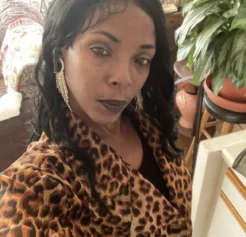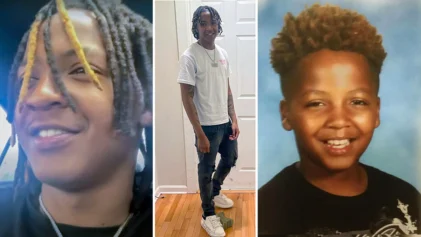Lawyers for an Alabama man facing a severe medical crisis will seek his compassionate release from state prison.
After his family raised the alarm about his deteriorating condition in the Elmore Correctional Facility in Elmore, Alabama, Kastellio Vaughan, 32, was moved to another facility where he is receiving medical care. However, one family attorney said the emaciated man needs a higher level of care than he is receiving at the Staton Medical Observation Unit to recover.
His legal team is seeking an “immediate transfer” to a “real world hospital.” The group of the nation’s top civil rights attorneys is also disputing reports that the man is refusing care.
“We’ve never seen that. We’ve never seen a prisoner say, please send me back to prison. This hospital is too comfortable,” attorney Lee Merritt told Atlanta Black Star.
Kassie Vaughan posted before-and-after photos of her brother Kastellio on Sept. 21. He had lost 75 pounds since she last saw him in late July, and prison officials removed her from his contact list. She received the photos from someone in prison with a message: “Get help.”
Kassie rallied for support for her brother on social media and created an online petition and a fundraising account. Kastellio Vaughan’s situation got the attention of attorneys Merritt, Ben Crump, Harry Daniels and thousands of others on social media.
Vaughan had surgery in August on an infected gunshot wound from 2013, his family said. The man had a portion of his intestines removed, and rather than allowing him to recover in the hospital, his family said he was placed in general population the same day as his surgery. Vaughan’s condition deteriorated because of inadequate facilities, abuse and medical neglect, his family’s legal team said. He is now 100 pounds, according to his sister.
His attorneys said other men in the prison were helping care for Vaughan. They made him a makeshift adult diaper and took turns changing him. One of the men sent his sister the urgent message when things got severe.
“This is not even a commendation made for him by the Alabama Department of Corrections. This was him and other prisoners trying to do their best under the circumstances,” Merritt said of the diaper.
Vaughan’s condition now at Staton is no better than when he was at Elmore, the attorney added.
“Their care, their resources to treat his injuries, and to treat his condition is no better than the Elmore facility that he was previously,” Merritt said.
According to attorneys, he was still wheelchair-bound, had difficulty eating, and his wound from the surgery had not healed when his family made contact with him.
“There’s pus coming out of his scar. His stomach is extended, and he is in need of immediate medical care, or he will die in that facility,” Merritt told Atlanta Black Star.
The Alabama Department of Corrections said in a Sept. 24 statement that Kastellio was walking and eating in the Staton infirmary. Officials said he requested and received medical attention at least 11 times in its prisons between July 30 and Sept. 22.
“As a result, each time he received appropriate medical treatment and/or care. As part of that care, he has spent at least 13 days in the institutional infirmary,” department officials wrote. “Additionally, he was treated at an outside hospital three times in the same time frame, resulting in one major surgery at least 17 days in the hospital.”
AL.com reports that department officials said Vaughan was admitted to Jackson Hospital in Montgomery twice and asked to be discharged against medical advice.
“The ADOC offers a constitutional level of care to all inmates. However, inmates are not required to undergo care, just as citizens in the civilian world are afforded choice of whether to receive care,” the department wrote.
According to the prison system’s handbook, an incarcerated person must notify a corrections officer of their need for emergency care.
“All emergencies or injuries will be screened for priority of treatment by health care staff and then will be examined or treated accordingly,” the handbook says.
Daniels said the question arises about what level of care Kastellio received under the department’s supervision.
“Incarceration does not mean you have the right to be inhumane,” Daniels told Atlanta Black Star. “If you are in prison, you are entitled to medical treatment, medical care. In fact, you’re entitled to a dentist. If you have high blood pressure, if you need to have heart surgery or any of those things.”
He added, “You got to understand that if the state takes custody of you, then the state is responsible for you, and the state cannot say that, ‘Oh, you didn’t want to do this, and you don’t want to do that.’ A person has a right to refuse anything, but at some point, you get to a point where there’s no ability to refuse. And in Mr. Vaughn’s situation — weak, unable to walk, unable to eat, unable to cleanse himself — is a clear indication that this person does not have the faculties and ability to care for himself.”
Vaughan’s family has visited and spoken to him since Kassie’s initial social media post. His legal team is working on getting a face-to-face visit with him, which he is entitled to under law. With the backing of the U.S. Department of Justice and the Alabama ACLU, his attorneys plan to campaign for his compassionate release.


